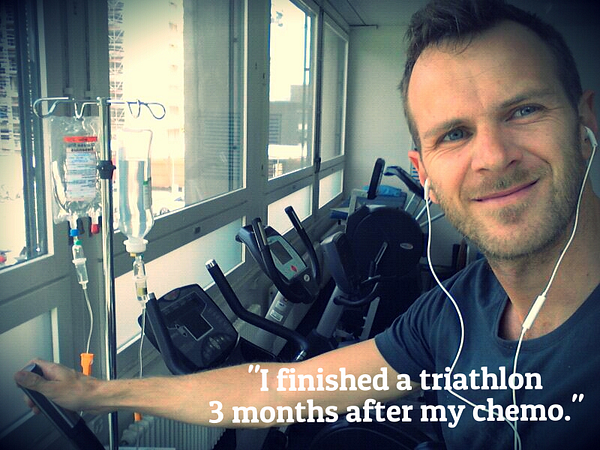F026 Cancer and the healing power of storytelling (Martin Inderbitzin, My Survival Story)
In 2012, right after finishing his PhD in neurobiology, Martin Inderbitzin finally decided to go for a well-deserved break. He went skiing with his friends, but the trip ended far less pleasant than he could ever have imagined.
After a fun night of fondue and wine with friends, Martin suffered from a stomach ache in the days that followed. Because the pain did not subside, he decided to visit his doctor. The diagnosis: a rare type of pancreatic cancer.
Martin Inderbitzin at Frontiers Health 2018.
After reading the devastating statistics and survival rates of patients with his type of cancer, Martin’s world crashed. He found his strength in another patient’s story. Martin’s doctor told him about another young man, who survived and was now skiing in the mountains. For the doctor that was an anecdote, for Martin a mantra that kept his spirits up, every time he received a piece of bad news.
Listen to the podcast in iTunes, Podbean or Stitcher.
He started thinking how impactful stories of others with similar struggles to our own can be. To help other patients like him, he started a media project My Survival Story.
He travelled around the world with his wife Katarina to search for, record, and film patients with inspiring stories. The stories are published in a podcast My Survival story and on the website.
During his chemotherapy, he decides to sign up for a triathlon despite he never practised endurance sport before. Three months later he crosses the finish line.

In the middle of his victorious win, and overwhelmed by feeling invincible, his cancer returned.
In the 25th episode of Faces of digital health Martin shares his knowledge regarding how to be a good presenter.
A good story will not be impactful if you don’t know how to share it with the audience.
He also talks about the need for mental health support which patients often don’t get as part of their medical treatment. Martin believes digital health support solutions are welcome, as many patients, especially men, feel looking for a psychotherapist would be a sign of weakness.
Mental health still holds a certain level of stigma and publishing stories and support groups online can reach those that might have been unreachable otherwise.
“When you get a cancer diagnosis, you receive all sorts of medical support without any psychological support. This should change because cancer is a serious hit to one’s mental health. If you have an emotional breakdown, you might discontinue your chemotherapy and that’s dangerous for your survival chances,” says Martin.
In the hope that their project will have a positive impact on patients around the world, he and his wife take a lot of time with each story they publish.
“A good story takes time to write. But it’s worth it because a good story will have a much bigger impact.”
In episode 25 of Faces of digital health:
Beating cancer once makes one feel invincible, but what happens when cancer comes back?
How is coping with the disease different today compared to 10 years ago, when less information and digital health solutions were available?
Did background in neurobiology help with coping with the disease in any way?
What can cancer patients learn from each other?
See Martin’s TED talk:

